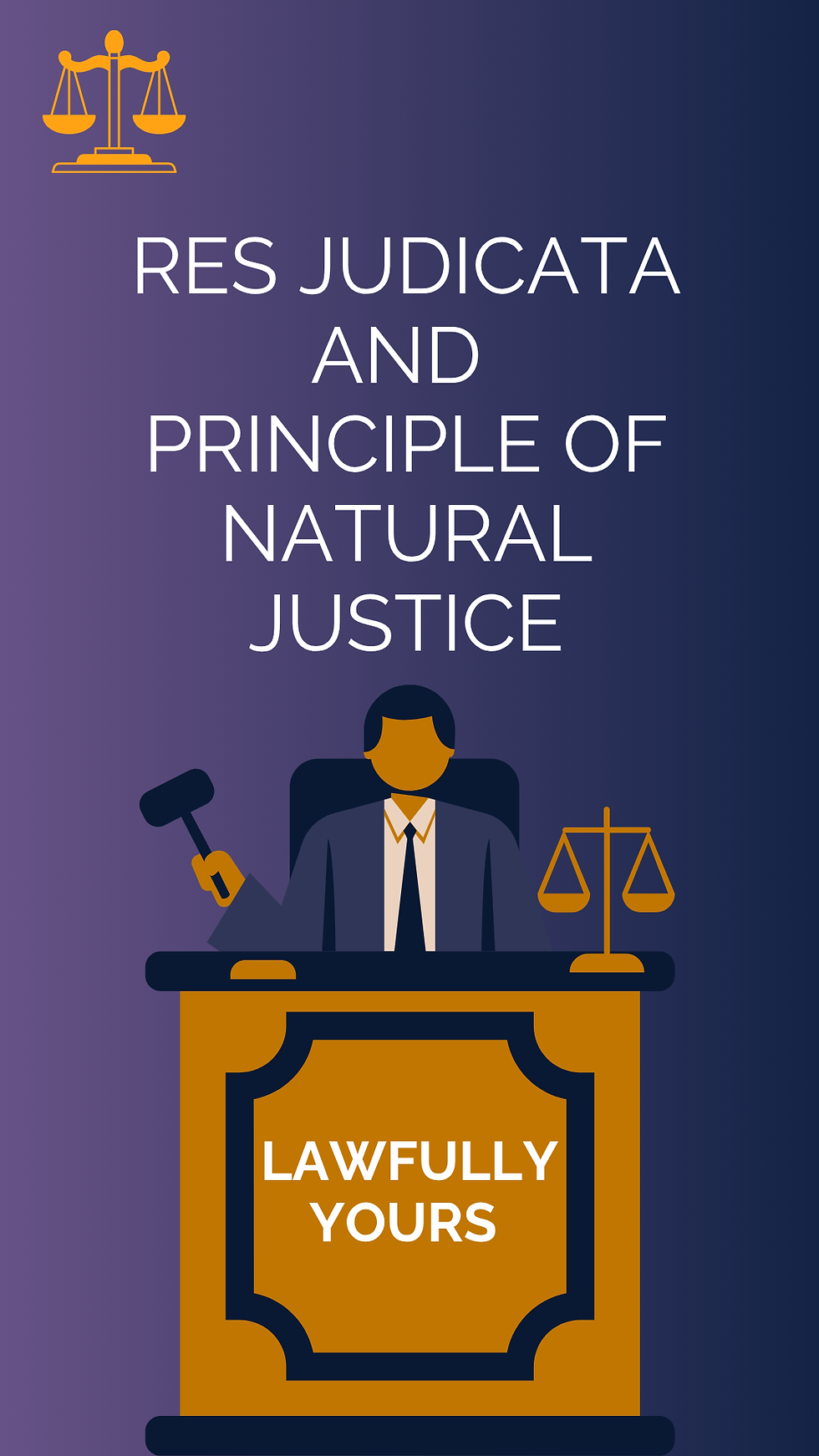🎯RES JUDICATA CAN'T BE INVOKED WITHOUT FAIR OPPORTUNITY TO RESPOND💡
- Subhodeep Chattopadhyay
- Jul 15, 2025
- 4 min read
Updated: Jul 29, 2025

⚖️ Bombay High Court Rules: Res Judicata Cannot Be Invoked Without Fair Opportunity to Respond - A Landmark Procedural Justice Decision
🔍 Key Takeaway
The Bombay High Court has delivered a significant judgment reinforcing the principles of procedural fairness and natural justice in civil litigation. In a landmark ruling, the Court held that res judicata cannot be invoked for the first time in a final judgment without proper notice and opportunity to respond.
📋 Case Background
In M/s. Unique Integrated Transport & Management Consultancies Pvt. Ltd. v. Mahanagar Telephone Nigam Ltd. & Ors., a Division Bench comprising Justices M.S. Sonak and Jitendra Jain was hearing an appeal against a Single Judge's decision that dismissed a suit with costs of ₹1 lakh.
🎯 The Core Issue
The controversy arose when the Single Judge dismissed the plaintiff's suit by invoking res judicata under Section 11 of the Civil Procedure Code (CPC), ruling that the claims had already been adjudicated in four prior arbitral awards between the parties. However, this decision was made without:
- 🚫 Res judicata being pleaded in the written statement
- 🚫 Any issue being framed at trial regarding res judicata
- 🚫 Parties being given opportunity to respond to this defense
⚖️ The Court's Reasoning
🔑 Fundamental Principles Violated
The Division Bench identified several critical procedural lapses:
1. Lack of Proper Pleading: The defense of res judicata was not raised in the written statement
2. Absence of Issue Framing: No specific issue was framed to address the res judicata question
3. Denial of Fair Opportunity: Parties were not given a chance to present evidence or arguments
📖 Legal Foundation
The Court emphasized a crucial legal principle:
"While the Court unquestionably has the power to frame additional issues or modify or recast existing ones, it is equally imperative that the parties be provided with a sufficient opportunity to address these new or altered issues."
🎯 Key Legal Principles Established
1. Procedural Fairness First 🛡️
The Court stressed that proper issue framing is not merely a formality but a fundamental requirement for fair adjudication.
2. Natural Justice Requirements ⚖️
The judgment highlighted that any procedural adoption must be consistent with principles of natural justice.
3. Evidence and Response Rights 📝
Parties must be allowed to:
- Lead relevant evidence
- Refer to all relevant documents
- Present arguments addressing the res judicata issue
📚 Supporting Legal Precedent
The Court relied on Prem Kishore and others Vs. Brahm Prakash and others [2023 (19) SCC 244], which establishes that:
"The basic method for determining the question of res judicata is first to determine the case… and then to ascertain what was decided by the judgment that operates as res judicata."
This precedent reinforces that res judicata requires thorough examination of cause of action identity between suits.
💡 Practical Implications for Legal Practice
For Lawyers 👩💼👨💼
- Always plead res judicata in written statements if applicable
- Request specific issue framing when res judicata is relevant
- Prepare comprehensive evidence to support or counter res judicata claims
For Courts 🏛️
- Frame proper issues before invoking res judicata
- Provide adequate notice to parties
- Allow sufficient opportunity for response and evidence
For Litigants 📊
- Understand procedural rights in litigation
- Expect fair opportunity to respond to all defenses
- Prepare for comprehensive case presentation
🔄 The Court's Final Decision
The Bombay High Court:
✅ Set aside the Single Judge's judgment and decree
✅ Remanded the matter for fresh consideration
✅ Granted liberty to frame res judicata issue if appropriate
✅ Directed that both parties must receive fair opportunity to address any such issue
🎯 Why This Judgment Matters
1. Strengthens Procedural Rights 💪
This decision reinforces that procedural fairness cannot be compromised for judicial expediency.
2. Protects Against Surprise Judgments 🛡️
Parties cannot be caught off-guard by defenses not properly raised during trial.
3. Ensures Comprehensive Adjudication 🔍
Courts must allow thorough examination of all legal issues before deciding cases.
4. Upholds Natural Justice ⚖️
The judgment reaffirms that fundamental fairness principles cannot be bypassed.
🚀 Moving Forward: Best Practices
For Legal Practitioners:
- Early Issue Identification: Raise all defenses including res judicata in written statements
- Comprehensive Pleading: Ensure all legal grounds are properly pleaded
- Evidence Preparation: Gather relevant documents and evidence for all potential issues
For Judicial Process:
- Proper Issue Framing: Frame all relevant issues at appropriate stages
- Adequate Notice: Provide sufficient notice before invoking new legal grounds
- Fair Opportunity: Ensure parties can meaningfully respond to all issues
📈 Conclusion
This Bombay High Court judgment represents a significant victory for procedural justice and fair litigation practices. By emphasizing that res judicata cannot be invoked without proper notice and opportunity to respond, the Court has:
- 🏆 Strengthened litigants' procedural rights
- 🔒 Ensured adherence to natural justice principles
- 📋 Clarified proper procedure for raising res judicata
- ⚖️ Reinforced the importance of fair adjudication
The decision serves as a crucial reminder that while courts have broad powers to frame issues and decide cases, these powers must be exercised with due regard for procedural fairness and natural justice.
This landmark judgment will undoubtedly influence civil litigation practice and reinforces the fundamental principle that justice must not only be done but must be seen to be done through fair and transparent procedures.
Case Citation: M/s. Unique Integrated Transport & Management Consultancies Pvt. Ltd. v. Mahanagar Telephone Nigam Ltd. & Ors. [Appeal No. 39 of 2013 in Suit No. 1165 of 1996]
Keywords: Bombay High Court, Res Judicata, Section 11 CPC, Natural Justice, Procedural Fairness, Civil Procedure, Legal Rights, Court Procedure, Litigation Practice


Comments